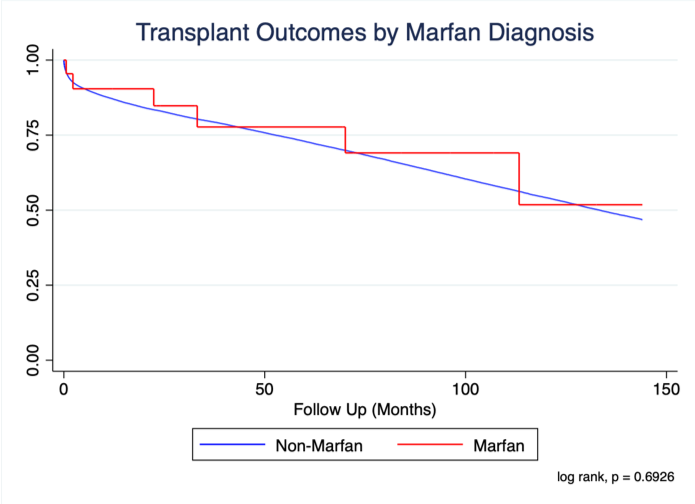Heart Transplantation Outcomes in Patients with Marfan Syndrome: A UNOS Registry Analysis
1Keck Medicine of USC, Los Angeles, CA, 2Newark Beth-Israel Medical Center, Newark, NJ, 3University of Arizona Sarver Heart Center, Tucson, AZ, 4Harbor-UCLA Medical Center, Torrance, CA
Meeting: 2020 American Transplant Congress
Abstract number: B-275
Keywords: Donation, Heart/lung transplantation
Session Information
Session Name: Poster Session B: Heart and VADs: All Topics
Session Type: Poster Session
Date: Saturday, May 30, 2020
Session Time: 3:15pm-4:00pm
 Presentation Time: 3:30pm-4:00pm
Presentation Time: 3:30pm-4:00pm
Location: Virtual
*Purpose: Marfan syndrome (MS) is an autosomal dominant connective tissue disorder due to a defect in the fibrillin-1 gene. MS patients can develop a discrete cardiomyopathy specific to their MS diagnosis. Due to known vascular complications and unknown effect of chronic immunosuppression in MS, we sought to investigate long-term heart transplant outcomes in MS patients.
*Methods: The UNOS registry was used to compare patient characteristics and transplant outcomes between MS and non-MS patients. Patients were excluded were age <10y, lost-to-follow-up, and multi-organ transplant recipients. Multivariate Cox proportional hazard regression model adjusting for age, sex, race, diabetes, ischemic time, need for dialysis/life support, recipient wait-time, and HLA mismatch. Kaplan Meier survival was censored at 10 years.
*Results: Between 1987 and 2019, 22 patients with MS received heart transplants with a mean age of 35.0 ± 16.3 years of which the majority were male (73%) and Caucasian (73%). Patients with MS were more likely to have had prior non-transplant cardiac surgery (54.5% vs. 18.3%, p < 0.001) and require ventilator support (13.6% vs 4.2%, p=0.029). Mean waitlist times were similar between the two groups (MS vs other: 94.0 days vs 83.0; p=0.54). There was no significant difference in ischemic time. There was no difference in survival post heart transplant (log rank, p=0.69).
*Conclusions: Despite increased prior cardiac surgery and ventilator use, post heart transplant survival for patients with Marfan syndrome was excellent with no difference compared to non-MS patients. While further study is warranted, selected patients with Marfan syndrome should not be excluded from heart transplantation.
To cite this abstract in AMA style:
Genyk P, Yang K, Pizula J, Lee A, Miklin D, Shah S, Nuno S, Hashmi S, Nattiv J, Kiankhooy A, Grazette L, Fong M, Rahman J, Pandya K, Vaidya A, Vucicevic D, Li J, Kingsford P, Banankhah P, Wolfson A, Liu G, Chand R, Depasquale E. Heart Transplantation Outcomes in Patients with Marfan Syndrome: A UNOS Registry Analysis [abstract]. Am J Transplant. 2020; 20 (suppl 3). https://atcmeetingabstracts.com/abstract/heart-transplantation-outcomes-in-patients-with-marfan-syndrome-a-unos-registry-analysis/. Accessed February 22, 2026.« Back to 2020 American Transplant Congress

